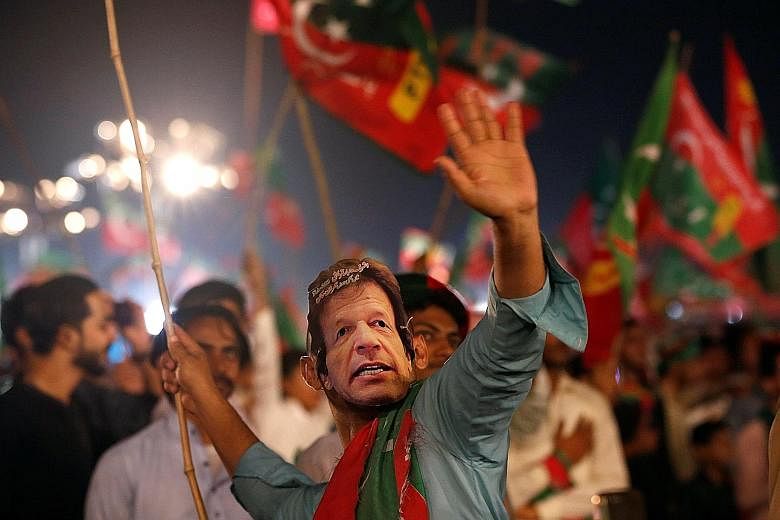ISLAMABAD • Cricket star-turned-politician Imran Khan is hoping to become Pakistan's prime minister after 20 years of being dismissed at the polls, as the country prepares to vote in a tense election pitting him against the party of jailed former premier Nawaz Sharif.
Just over a decade after the end of Pakistan's most recent era of military rule, today's vote features competing narratives of democracy amid Sharif's accusations that elements of the powerful army are working to throw the race to Mr Khan, which he denies.
Mr Khan, 65, has hailed Sharif's conviction on corruption charges this month as proof that democracy is maturing in the nuclear-armed Muslim-majority nation of 208 million by finally holding its venal political elite accountable. Supporters of Sharif, whose party is now led by his younger brother Shehbaz, argue his downfall was politically motivated and engineered by the army establishment, representing a blow to the "sanctity of the vote" that gave his Pakistan Muslim League-Nawaz (PML-N) a majority in the last elections.
The election comes as Pakistan's economy is in crisis, with the rupee's 20 per cent decline spiking inflation, and dwindling foreign currency reserves likely to force the second International Monetary Fund bailout since 2013. Recent nationwide polls indicate a tight race, with Mr Khan's party ahead on 30 per cent in one survey, against 27 per cent for PML-N. Sharif's party tops another poll with 26 per cent, against 25 per cent for Mr Khan's Pakistan Tehreek-e-Insaf (PTI), or Pakistan Justice Movement.
In third place was the Pakistan People's Party (PPP) of Mr Bilawal Bhutto Zardari, 29, the son of two-time premier Benazir Bhutto, who was assassinated in 2007. The PPP could emerge as a coalition kingmaker if no party wins a majority, as many expect.
Mr Khan, however, is wary of governing with the established parties.
"If we have to make a coalition with either of the two main parties, then it means we can't bring about any major reforms,"said Mr Khan, who as captain led Pakistan to victory in the 1992 Cricket World Cup.
PPP leaders have recently joined PML-N in decrying "pre-poll rigging" involving restricted campaigning, quashed media coverage and candidates intimidated by military officers to change allegiance to Mr Khan. The military, which has ruled Pakistan for nearly half of its 71-year history, denies any effort to influence the election. The divisive campaign is likely to complicate any coalition negotiations after the vote, if they are necessary.
"I think you could have a complete collapse in terms of ability to form a government right after the election," said Mr Moeed Yusuf, a Pakistani analyst at the United States Institute of Peace, a Washington think-tank. To gain a majority, a party needs 137 of the 272 elected National Assembly seats. A further 70 seats for women and minorities are awarded proportionally based on the voting percentages.
In 2013, the PML-N won 126 seats, while PTI came third with 28 seats. After the results, 27 winning independent candidates joined Sharif's party to give it a majority.
Mr Khan has banked on gains in the PML-N stronghold of Punjab, Pakistan's most-populous province that has 141 elected seats, for his path to victory, successfully courting many so-called"electables" - entrenched local power brokers who often hold sway over about a quarter of Punjab's seats.
Two new hard-right Islamist parties also may cut into the PML-N's conservative voter base. However, the PML-N could reap a sympathy vote after Sharif returned home to be arrested on July 13 along with his daughter Maryam, leaving his cancer-stricken wife in a London hospital. They deny wrongdoing.
Those who voted for Sharif may also be annoyed that the three-times elected prime minister has never been allowed to complete a term. Sharif, 68, was removed by presidential decree in 1993, in a military coup in 1999, and last year by the Supreme Court, which ordered his corruption trial.
REUTERS

